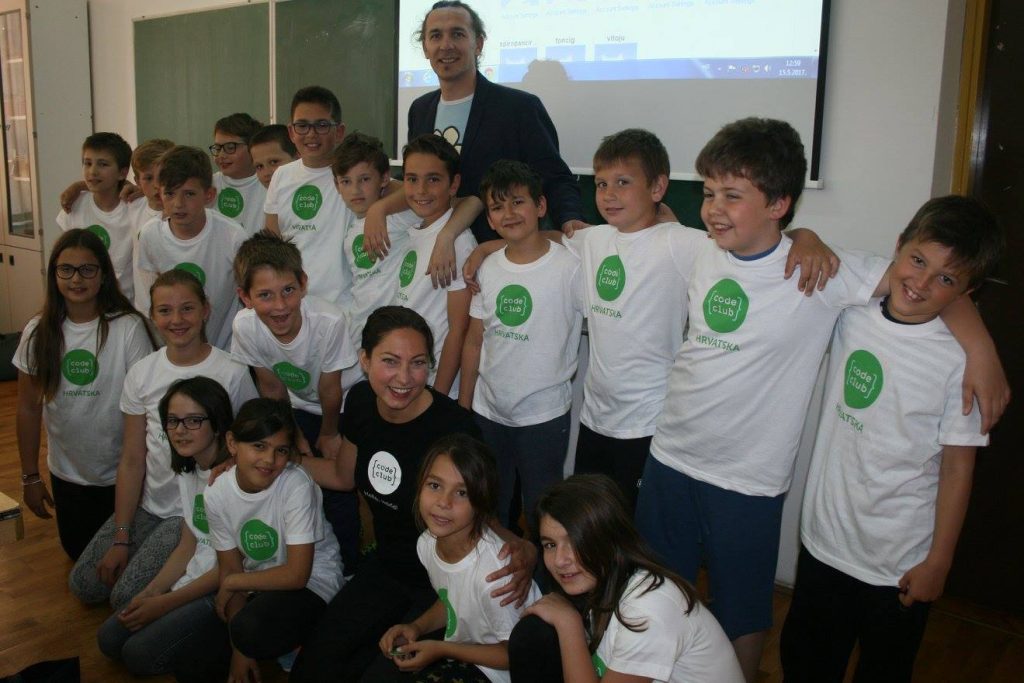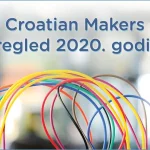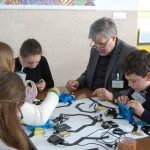March 14, 2018 – We’re starting a new series dedicated to Croatia’s best and brightest: young innovative minds shining as beacons of hope in a country that’s doing its best to intentionally block all attempts at progress and development. From talented elementary school pupils to young entrepreneurs, from world championship winners to exceptional startups, we’ll be sharing inspiring stories to show our society just might have a shot at rising above the discouraging state of affairs. Starting with a story of a remarkable initiative from Primošten which took two kids from an elementary school class to the world championship in robotics in China
“The world is quickly changing as a consequence of the technology development and digitalization, but the educational system (curriculum, teaching methods and the general concept) in most countries remains almost the same as it was a century ago. There is no point to wait for our governments to change this — they do not see it as a priority because it does not bring short-term, easily visible result, and because it provokes confrontations over some sensitive world-view issues. Instead, we, as forward-thinking individuals, should get involved and try to ‘infiltrate’ into the system, either physically (as volunteering teachers) or by pushing our tools and ideas to schools.”
The paragraph above is an excerpt from a piece written by Kristijan Perković on the STEM revolution in Croatia and published on Medium in January 2018. It’s also a perfect summary of a burning issue the Croatian education system is facing – the world is indeed changing, and that very system should be preparing children for the future job market, one that will involve dozens of jobs that have not yet come into existence. We’re supposed to raise independent thinkers, encourage creativity and innovation, and instead, we’re sticking to a rigid, outdated education model. It might have worked in the Austro-Hungarian times, but as hundreds of jobs are rapidly getting automatised, it’s not exactly working anymore – what to do, when your own country is stubbornly ignoring a desperate need for reforms?
Take matters into your own hands, and see if something can be done on a micro-level. You just might set a larger chain of development into motion.
But let’s back up a bit. We’ve been hearing a lot about the STEM revolution in the last year or so – here’s a short recap of the process to refresh your memory. A couple of years ago, Croatian entrepreneur and investor Nenad Bakić started a private foundation called Croatian Makers / IRIM – Institute for Youth Development and Innovativity, having concluded there was no better way for a society to directly influence their country’s future than to invest in education, starting from an early age. Soon thereafter, he launched the remarkable initiative STEM revolution in Croatia, donating robotics kits to schools and ensuring that interested teachers are provided with education required to carry out the programme in their classes. What followed was a trial period of a new project, providing a number of selected schools with small programmable computers called micro:bit, designed and developed to entice curiosity and spark an interest for technology in school students.
As the project grew, it called for substantial funds so it could be implemented in more Croatian schools. Bakić thus launched a crowdfunding campaign which raised $300.000, five times his original goal. The success of the campaign and Bakić’s ongoing efforts, combined with support from the Croatian Ministry of Science and Education, led to the majority of 6th grade students in Croatia receiving micro:bit computers since.
As Perković stated in his piece, the STEM revolution project proved it was possible to influence the education system in a way that would encourage children to be digital makers, instead of just consumers of technology. So he took it upon himself to contribute to the movement himself: he decided to bring Computer Science education to early grades of the primary school in Primošten by volunteering as an external teacher.
He started a Code Club in their school in Primošten, but also became a regional Code Club coordinator with a mission to start a Code Club in every primary school in his area. “Code Club is a global network of volunteers and educators who run free coding clubs for children aged 9–13 with the aim to inspire the next generation to get excited about computing and digital making. There are already over 11.000 registered clubs in more than 130 countries, involving 150.000 children. Code Club has recently merged with Raspberry Pi foundation, together with CoderDojo which uses a very similar concept. Another similar organization is Code.org in the USA”, he explained in his piece.
In May 2017, the school was visited by the director of Code Club International Indra Kubicek, who flew in from London to attend a weekly class in Primošten and present the students with awards for participating in their programming workshop. In turn, Perković took three of his students to a presentation of Code Club Croatia in Zagreb, organised by the association Programerko and the British Embassy.
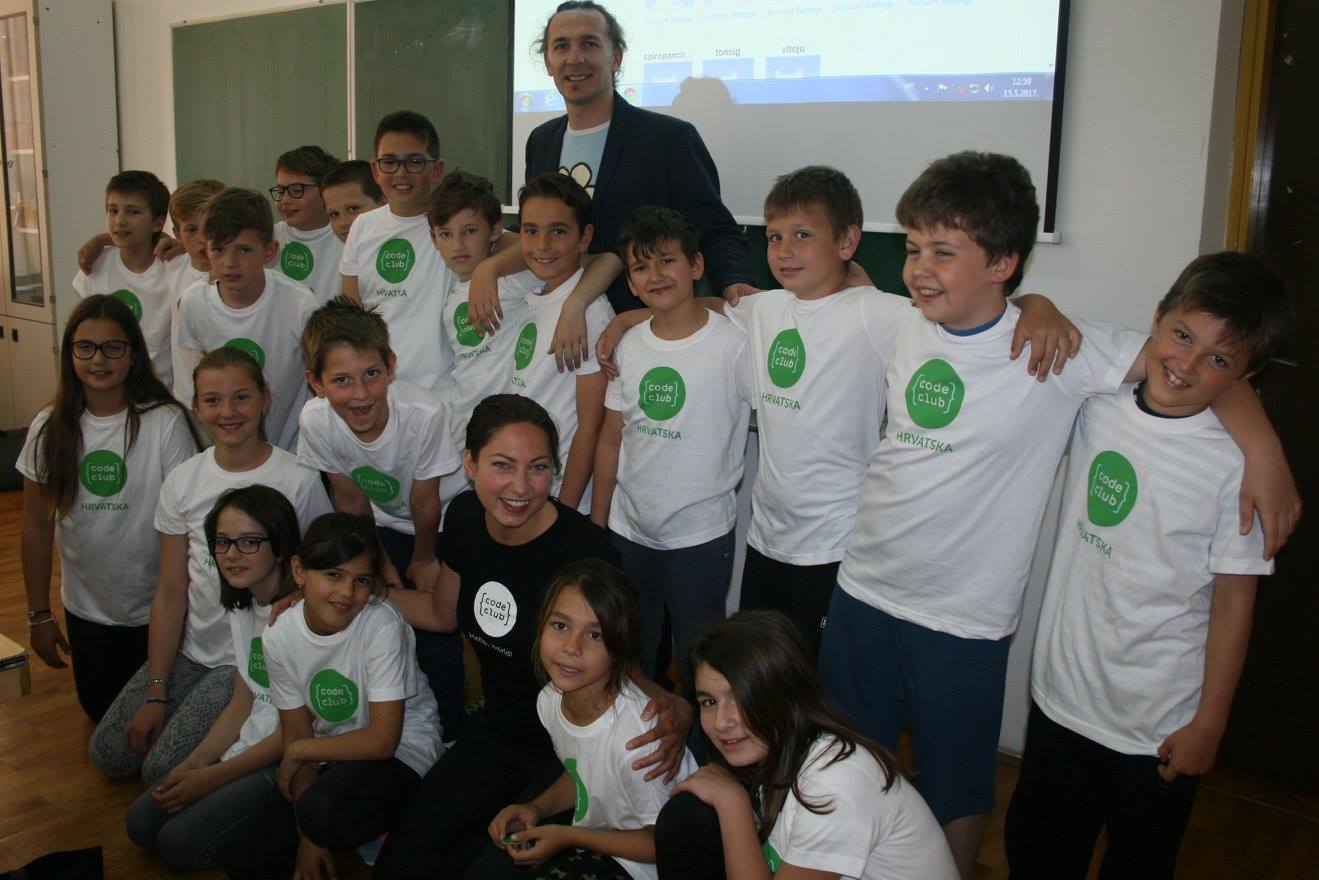
Indra Kubicek and Kristijan Perković with pupils from Primošten / Code Club Primošten Facebook
The success story of education in robotics and computer science in the primary school in Primošten started in early 2016 when Croatian language professor and librarian Amalija Pancirov, encouraged by Perković (as a parent of Pancirov’s pupil), applied to the Croatian Makers national-level tender for robotics equipment. She received free mBot kits and training from IRIM, and went on to teach basics of robotics to her pupils. From that point on, the project in Primošten only kept growing. The school was provided with Abilix, advanced educational robot construction kits designed for school children.
Pancirov’s efforts were quick to see results: Perković’s daughter Marisa and another 3rd grade student named Benjamin Aron Balogh qualified for WER Croatian Open, a robotics competition organised by IRIM which took place in Zagreb in September 2017. The competition saw 60 teams and around 200 contestants from all parts of the country, as well as from the neighbouring countries of Bosnia and Herzegovina and Serbia.
Marisa and Benjamin, the only pupils to represent their Šibenik-Knin County, took away the gold medal in their category of grades 1-4, scoring an opportunity to present their skills at the World Educational Robot Contest in Shanghai in November 2017. Primošten Municipality participated in the travel costs with 5.000 kuna and also donated three laptops to the school. Another two were donated by Šibenik-Knin County. The company Primošten Hoteli provided them with transport to Zagreb Airport.
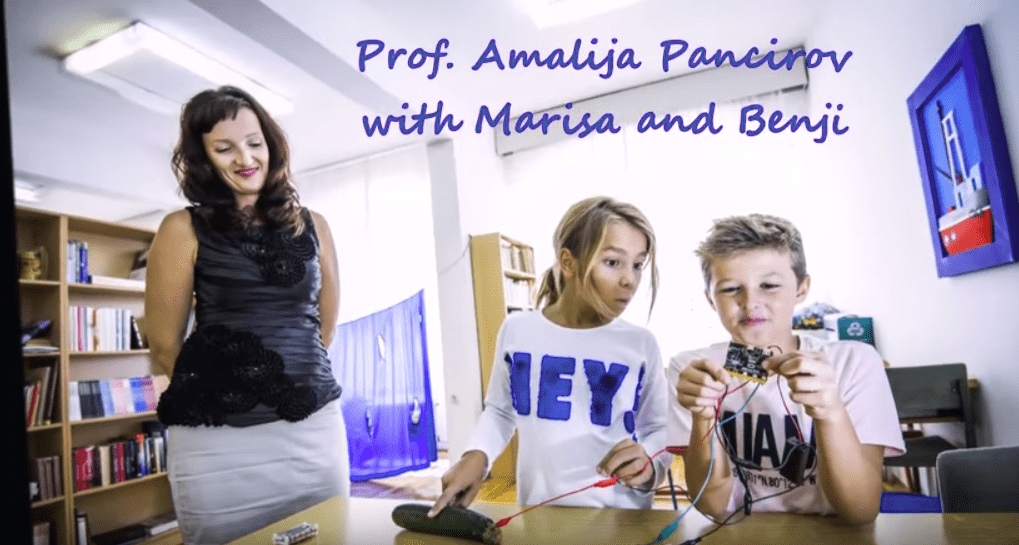
Marisa and Benjamin with their mentor Amalija / YouTube screenshot
The young whizzes went on to practice and work on their project for multiple hours a day after class, mentored by Pancirov in their school library. They had to program their Abilix robots to carry out certain tasks, experiencing some difficulties along the way: “Robots are not people. They do what people tell them to do. They don’t have a mind of their own. The one we have is dumb”, young Benjamin charmingly explained, adding he had enrolled in the robotics class on his own, without any influence from his parents or teachers. Marisa in her turn stated she had taken the class as it sparked her interest, and explained what they had to achieve before they started packing for China: “For example, [the Abilix] needs to move along a line and come to a bridge, fold that bridge, turn around and proceed to its next task. It also needs to arrive to an assigned spot, pick up two cubes and take them back to the starting point. There are six tasks in total it needs to solve, but we still need to work on our Abilix”, she said.
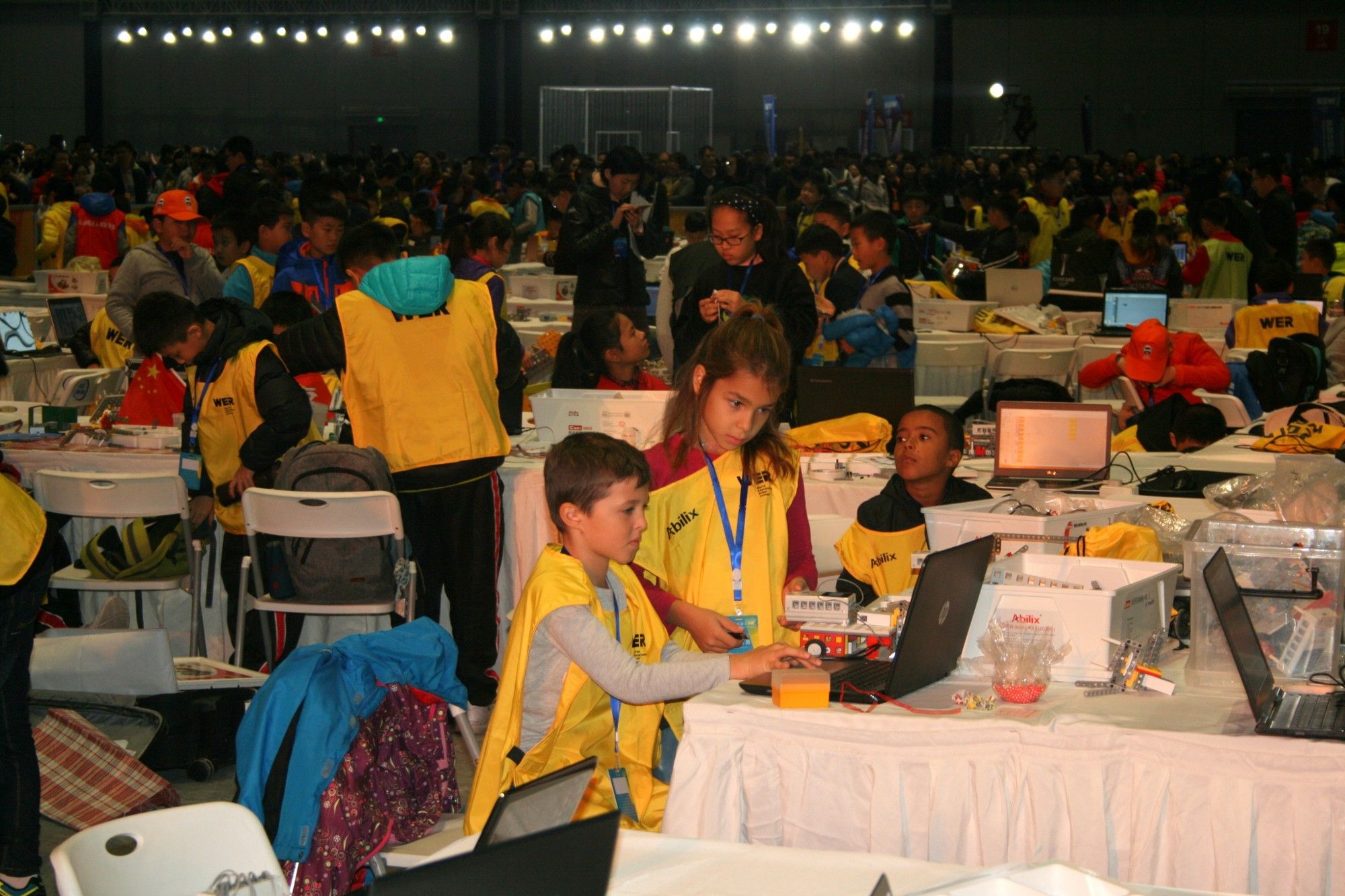
Benjamin and Marisa at WER contest in Shanghai / Medium
The students from Primošten ended up winning an award at WER contest in China, which saw some 3000 teams counting over 8000 students from all over the world. The competition involved a video category which required participating teams to film a video about themselves and robotics. Marisa and Benjamin were awarded for best editing, while the Primary School Julije Klović from Zagreb took away the best presentation award. Another Croatian team, the Vocational School Vice Vlatković from Zadar, got an award for outstanding contribution in a special category which recognises teams who have shown exceptional creativity in problem-solving and considerable knowledge about the contest itself. All Croatian participants at WER contest in China, as well as their mentors, had their travel expenses covered by a donation from the City of Zagreb in the amount of 50.000 kuna.
Marisa and Benjamin got from having no knowledge of robotics whatsoever to competing at a world championship in a matter of several months, all due to a commendable initiative of a forward-thinking parent and an exceptional teacher who encouraged them to practice their skills and cheered them on every step of the way. Imagine how much our younger generations could achieve if we only provided them with appropriate resources and a support network that would inspire them to fulfill their potential. Where there’s a will, there’s a way, stated Pancirov, who had never expected to end up dealing in robotics and programming. Now, she sees it as the future, and aspires to work with kids on interesting things that might lead them to achieve outstanding results. “My goal is for them to be happy. To be honest, happy young people of morals”, she said. Is there a better goal to strive for?
Do you have an inspiring story you would like to see featured? Send us an email to [email protected] or message us on Facebook.

